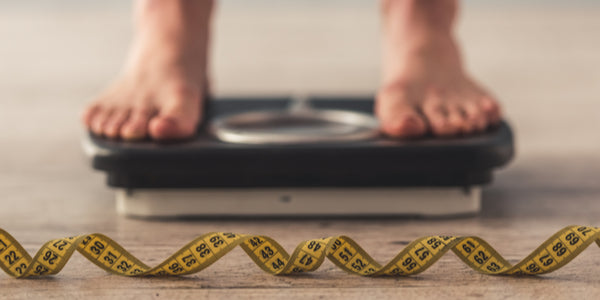
Appetite regulation is complex, and for good reason: human survival depends on eating.
Did you know there are over 30 hormones made in the gastrointestinal tract (gut) alone?
The brain and gut produce hormones and other chemical messengers that act as hunger signals. Interaction between these signals from the brain and the gut leads to the feeling of hunger, or fullness (satiety).
While the body has hunger hormones to signal when to eat and stop eating, they can easily be overridden by our will. You can eat past feeling full or delay eating even if your stomach is growling. However, learning to “listen” to these hunger hormones can take some readjustment and digging into mindful cues.
Curious to learn how you can control hunger hormones? Discover how these hormones work and ways to help your body pay attention to these cues.
What Are the Hunger Hormones?
While there are many hormones that play a role in appetite regulation, ghrelin and leptin are the primary regulators. The impact of the hormone insulin and blood sugar also play a part.
Ghrelin
Ghrelin is the major gut hormone that stimulates appetite. It is released from the stomach when the stomach is empty to signal the brain it is time to eat.
Ghrelin is considered a short-acting hormone. It increases right before eating but dips down after eating.
Leptin
Leptin, also known as the hunger-suppressing hormone, is not released from the digestive tract. It is released from fat cells and sends a signal to the brain to suppress appetite long-term. In theory, the more fat cells, the stronger signal is sent to the brain to lower appetite and shift to burning fat as a fuel.
However, what can happen, is leptin resistance. Similar to insulin resistance, the brain doesn’t listen to leptin’s signal for lowering appetite. Leptin resistance can occur with obesity.
Blood Sugar and Insulin
When blood sugar rises, it causes the hormone insulin to be released. The higher the blood glucose, the more insulin is released. One of the actions of insulin is to decrease blood glucose by promoting its uptake into cells.
When blood sugar levels are low, that sends a signal to the brain that it is time to eat. When blood sugar levels are elevated after eating, it signals to suppress appetite signals.
5 Ways to Tune Into Hunger Hormones
In a perfect setting, ghrelin, leptin, and other hormones work together to balance hunger and satiety cues. However, many factors can influence the regulation of these hunger hormones such as obesity, genetics, health conditions, medications, diet, and sleep. Not all factors can be changed but there are actionable tips to tune into and control hunger.
1. Avoid Sugary Foods and Drinks
Eating lots of sweets and sugary foods may leave a person feeling always hungry. These simple carbohydrates are absorbed quickly and enter the blood rapidly.
This can result in a blood sugar “spike” and subsequently drop when high amounts of insulin follow. Additionally, sugary foods and drinks can interfere with ghrelin’s decline after eating.
Giving up refined sugar and minimizing hidden sources of sugar can help control hunger hormones. Choose whole-grain breads, cereals, etc. that are higher in fiber and will provide longer satiety when eating with lean proteins and healthy fats.
2. Chew Your Food Well
It sounds simple, but the act of chewing has important effects on appetite and hunger, and may even impact hunger hormones. A 2015 review found increasing the number of chews per bite increased gut hormone release. The review found that increased chewing can lower feelings of hunger and increase satiety.
Today's busy lifestyles promote many convenient, easy-to-eat foods that don't require a lot of chewing. Including food that by its very nature requires some real chewing effort, might be a way to outsmart hunger hormones.
Some ideas to chew food better include the following:
• Replace applesauce with an apple
• Instead of a smoothie, try a tossed salad, raw veggies, or fresh fruit, nuts, and yogurt
• Munch on whole nuts as an alternative to peanut butter
• Substitute a whole grain bagel for regular bread on a sandwich
• Chew gum
3. Get Enough Sleep
Sleep is very important to appetite regulation. Studies show disruption in sleep is a factor in obesity, and has a direct effect on hormones involved in appetite regulation, including an increase in ghrelin which will heighten feeling hungry throughout the day.
The latest recommendations from the National Sleep Foundation are:
• Younger adults (18-25): 7-9 hours
• Adults (26-64): 7-9 hours
• Older adults (65+): 7-8 hours
To improve sleep quantity and quality:
• Establish a sleep schedule even on weekends
• Exercise daily
• Spend time outside
• Remove all electronics from the room
• Create a quiet, dark, relaxing, and comfortable environment in your room
4. Eat Higher Volume Foods
Following a volumetrics diet can help control hunger hormones. The volumetrics diet encourages filling up on foods that take up a lot of volume in the stomach to make you feel satisfied after eating. The increase in stomach volume can help turn down ghrelin, the hormone that increases appetite.
Foods like fruits, vegetables, broth-based soups, and low-fat dairy products can help you fill up without drastically increasing calories. Diets high in fiber can also help with regulating blood sugar and maintaining a healthy weight.
5. Drink More Water
Along with eating high-volume foods, staying hydrated throughout the day can help regulate appetite hormones. While everyone’s water needs can vary, a general goal can be to work towards 8 cups of water per day.
If you are slightly dehydrated, the brain may misinterpret this signal as the need to eat something. If you are feeling the urge to eat, try hydrating with a glass of water before eating to see if that was what your body needed.
Hunger Hormones In Conclusion
While many hormones can have a role in appetite regulation, the main hunger hormones are ghrelin and leptin. Ghrelin acts as a short-term signal to increase eating and instigate stomach rumbling to encourage eating food.
Leptin is produced from fat cells. The more you have, the more leptin gets released to suppress appetite over the long haul. However, leptin resistance can interfere with the accuracy of the hormone.
Maintaining a healthy weight, chewing food thoroughly, getting enough sleep, avoiding too much sugar, and eating high water, high volume foods can help then hunger hormones function how they should. These steps can also sharpen the brain and gut connection to regulate feelings of fullness.
References:
Lyons G. How leptin and Ghrelin Control Weight Loss - EndocrineWeb. Published April 5, 2021. https://www.endocrineweb.com/news/63844-how-hunger-hormones-control-weight-loss.
Miquel-Kergoat S, Azais-Braesco V, Burton-Freeman B, Hetherington MM. Effects of chewing on appetite, food intake and Gut Hormones: A systematic review and meta-analysis. Physiology & Behavior. Published July 15, 2015. https://www.sciencedirect.com/science/article/pii/S0031938415300317.






